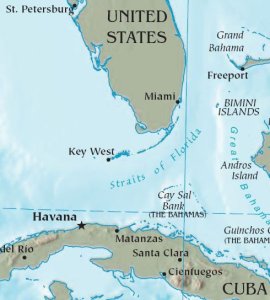A landmark moment in Cuban-American relations occurred mid-December when President Obama loosened regulations on the interactions between the two nations. The changes, which were brought about after negotiations to release American government subcontractor Alan Gross from Cuban custody, include a variety of different points. Among them, a much freer trade between the two countries, a quadrupling of the amount of remittances Cuban-Americans may send home (from $500 to $2000 each quarter), as well as the ability of travelers who meet certain criteria to fly directly to Cuba. These changes continue an overall trend in recent years of diluted sanctions present in the American embargo of Cuba.
 The origins of the Cuban Embargo begin with the rise to power of Fidel Castro in 1959 after his successful militarized revolt over then leader Fulgensio Batista. American leaders viewed Castro’s ideologies as extremist, which led to the implementation of a trade embargo, as well as a severing of all diplomatic relations with Cuba the following year. In 1993, the U.S. tightened the embargo, forcing Cuban leadership to sign an agreement with the U.S. allowing the emigration of 20,000 Cuban refugees per year to quell protests from its citizens.
The origins of the Cuban Embargo begin with the rise to power of Fidel Castro in 1959 after his successful militarized revolt over then leader Fulgensio Batista. American leaders viewed Castro’s ideologies as extremist, which led to the implementation of a trade embargo, as well as a severing of all diplomatic relations with Cuba the following year. In 1993, the U.S. tightened the embargo, forcing Cuban leadership to sign an agreement with the U.S. allowing the emigration of 20,000 Cuban refugees per year to quell protests from its citizens.
Since that time, sanctions within the embargo have been gradually reduced, allowing for freer travel and the promise of remittances to families and small businesses in Cuba. President Obama has been a sizable advocate for these reforms according to the New York Times. On December 17, President Obama announced his newest change to the embargo. In it, diplomatic relations with Cuba would be restored for the first time in over 50 years. Additionally, American citizens wishing to travel to Cuba for educational, cultural, or religious reasons, as well as humanitarian work, now have the right to do so. In the financial sector, American banks now will have the ability to open branches in Cuba, as well as to allow American customers to use United States credit or debit cards during their time in Cuba. Finally, imports and exports will be restored in a limited fashion, with American citizens being able to export up to $400 worth of Cuban goods, and up to $100 worth of articles like alcohol and tobacco. “I’m going to leave a shell, but it’s going to be a proverbial Easter egg – it’s going to be hollow” said Obama referring to the remaining sanctions within the Cuban embargo.
Reactions from Congress and other government officials from these changes have been mixed. Nowhere is this more obvious than the fact that the embargo against Cuba still stands in a limited sense. To lift the embargo would require action by Congress. In an interview with the New York Times, Senator Robert Menendez said Obama’s changes were “clearly intended to circumvent the intent and spirit of the U.S. law and the U.S. Congress.” Others quoted concerns about the implications of these changes, like Florida Senator Marco Rubio. “These new policies will have the effect of enriching the tyrant without benefitting Cubans,” he said in a statement to CNN.
However, others in power feel differently. On January 19, a group of 78 lawmakers and other officials signed a document stating their advocacy for the Obama administration’s changes in preparation for the upcoming State of the Union address. Notable among the signed are Secretary of State, George Schultz; President Clinton’s National Security Advisor, Sandy Berger; and former U.S. Ambassador to the U.N. and New Mexico governor, Bill Richardson; among others. In the letter, they were quoted saying, “We may disagree on a number of issues, but we’ve found common ground for a simple reason; our fifty-four-year-old approach intended to promote human rights and democracy in Cuba has failed.”
